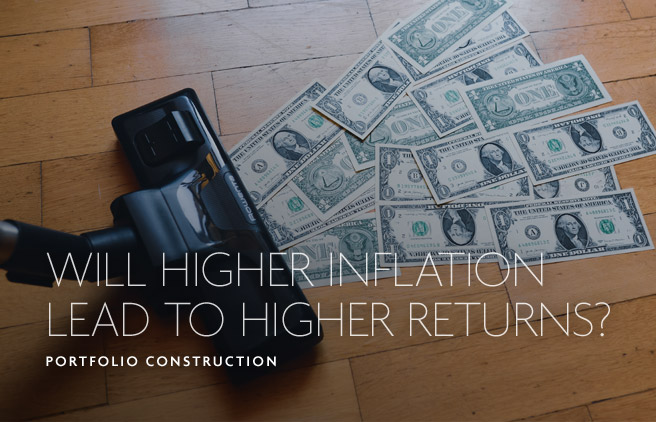
Will Higher Inflation Lead to Higher Returns?
A lot of you may have noticed that some of your favourite products and services have become more expensive, or even out-of-stock. These are the side effects of central bank monetary policy and COVID-19 shutdowns. When consumer demand and inflation are going up, how can you be sure your investments do too? Let’s look at how current economic factors are influencing markets to find out.
More money, more problems
First off, there is a lot more currency in the world than 18 months ago. Unfortunately, because there’s more of it, it’s also worth less and we need more dollars to buy the same item. In addition, COVID-19 shutdowns have changed labour markets. The types of jobs and skills needed have shifted as technology continues to advance us to a virtual world. Plus, people are choosing different career paths or even opting for early retirement, which has created a job supply issue. So, even though unemployment has fallen as people return to the workforce, the global economy is struggling to fill positions as well as orders at different parts of the supply chain.
Economics 101: Supply and demand
To get a better understanding, let’s look at the global chip shortage—the kind that goes in your electronics and not the tasty snack. A long time ago, the seat in your car was controlled by a lever (mechanical era). This was followed by power seats (electrical) operated with buttons. Now, thanks to technology, these seats require a micro chip that’s connected to the centre console for buttonless operation!
But the recent supply chain shortages have meant many car manufacturers can’t access these chips fast enough, so they cut production. This led to an unusual growth in demand for used cars and, ultimately, their prices. This is just one example of the impact technological advancements and supply chain shortages have had on our economy.
Outpacing inflation
The other major influence concerning investors right now is inflation, more importantly, how to beat it. Long gone are the days of being able to buy GICs from banks, or government and corporate bonds with enough yield to outpace inflation. Statistics Canada reported inflation was at 4.4% in September (year-over-year). This compares to 3-year GIC, government and corporate bond returns at 0.57%, -4.31% and -0.64% for the same period, respectively. Meanwhile, stocks have provided meaningful returns and investors who chose to sit out, missed out.
The importance of diversification
Obviously, stocks also bring volatility, which is never pleasant. That’s why we’ve crafted multi-asset portfolios that balance the need to beat inflation and preserve capital. To accomplish this, the portfolios invest in stocks that are diversified across different countries and sectors. They also take advantage of the low and negative correlations between asset classes by investing in government bonds, corporate bonds and currencies.
Having 100% of your portfolio invested in stocks is very risky. But having some equity exposure provides growth and a different return profile to bonds. For example, when economies perform well, stocks tend to as well, while bonds may lag as interest rates rise.
Where will inflation and the markets go?
While stock prices have jumped in the last 12 months, it’s less concerning as earnings are also rising due to inflation, productivity and high demand. We anticipate this growth cycle will last. As our lifestyles have not yet fully recovered from the pandemic, employment and consumption growth will likely continue for some time, elongating the recovery.
Inflation itself is also likely to remain above trend levels. Wages are growing as companies know they can pass the cost to consumers since supply and demand is largely imbalanced across many sectors. Hence both the costs of production, and of end products and services are rising. Higher oil prices will probably also play a role, but not as influential as in the 70s and 80s since we generally consume less due to efficiency. We expect inflation to moderate in the second half of 2022 and remain closer to 3% and not the 2% that we’re used to. That’s a fair amount of purchasing power to lose if you do not invest properly.
 By Alfred Lam, CFA, Senior Vice-President and Chief Investment Officer
By Alfred Lam, CFA, Senior Vice-President and Chief Investment Officer
Marchello Holditch, CFA, CAIA, Vice-President and Portfolio Manager, CI GAM | Multi-Asset Management
This document is intended solely for information purposes. It is not a sales prospectus, nor should it be construed as an offer or an invitation to take part in an offer. This report may contain forward-looking statements about one or more funds, future performance, strategies or prospects, and possible future fund action. These statements reflect the portfolio managers’ current beliefs and are based on information currently available to them. Forward-looking statements are not guarantees of future performance. We caution you not to place undue reliance on these statements as a number of factors could cause actual events or results to differ materially from those expressed in any forward-looking statement, including economic, political and market changes and other developments. CI Assante Wealth Management and its dealer subsidiaries, Assante Capital Management Ltd. and Assante Financial Management Ltd. (collectively “Assante”) are affiliates of CI GAM | Multi-Asset Management, which is a division of CI Global Asset Management. Evolution Private Managed Accounts are managed by CI Global Asset Management under the United Financial brand and are available exclusively through your Assante advisor. Neither CI Global Asset Management nor its affiliates or their respective officers, directors, employees or advisors are responsible in any way for damages or losses of any kind whatsoever in respect of the use of this report. Commissions, trailing commissions, management fees and expenses may all be associated with investments in mutual funds and the use of the Asset Management Service. Any performance data shown assumes reinvestment of all distributions or dividends and does not take into account sales, redemption or optional charges or income taxes payable by any securityholder that would have reduced returns. Mutual funds are not guaranteed, their values change frequently and past performance may not be repeated. Please read the fund prospectus and consult your advisor before investing. CI Assante Wealth Management is a registered business name of Assante Wealth Management (Canada) Ltd. CI Global Asset Management is a registered business name of CI Investments Inc. This report may not be reproduced, in whole or in part, in any manner whatsoever, without prior written permission of CI Assante Wealth Management. Copyright © 2021 CI Assante Wealth Management. All rights reserved.
A lot of you may have noticed that some of your favourite products and services have become more expensive, or even out-of-stock. These are the side effects of central bank monetary policy and COVID-19 shutdowns. When consumer demand and inflation are going up, how can you be sure your investments do too? Let’s look at how current economic factors are influencing markets to find out.
More money, more problems
First off, there is a lot more currency in the world than 18 months ago. Unfortunately, because there’s more of it, it’s also worth less and we need more dollars to buy the same item. In addition, COVID-19 shutdowns have changed labour markets. The types of jobs and skills needed have shifted as technology continues to advance us to a virtual world. Plus, people are choosing different career paths or even opting for early retirement, which has created a job supply issue. So, even though unemployment has fallen as people return to the workforce, the global economy is struggling to fill positions as well as orders at different parts of the supply chain.
Economics 101: Supply and demand
To get a better understanding, let’s look at the global chip shortage—the kind that goes in your electronics and not the tasty snack. A long time ago, the seat in your car was controlled by a lever (mechanical era). This was followed by power seats (electrical) operated with buttons. Now, thanks to technology, these seats require a micro chip that’s connected to the centre console for buttonless operation!
But the recent supply chain shortages have meant many car manufacturers can’t access these chips fast enough, so they cut production. This led to an unusual growth in demand for used cars and, ultimately, their prices. This is just one example of the impact technological advancements and supply chain shortages have had on our economy.
Outpacing inflation
The other major influence concerning investors right now is inflation, more importantly, how to beat it. Long gone are the days of being able to buy GICs from banks, or government and corporate bonds with enough yield to outpace inflation. Statistics Canada reported inflation was at 4.4% in September (year-over-year). This compares to 3-year GIC, government and corporate bond returns at 0.57%, -4.31% and -0.64% for the same period, respectively. Meanwhile, stocks have provided meaningful returns and investors who chose to sit out, missed out.
The importance of diversification
Obviously, stocks also bring volatility, which is never pleasant. That’s why we’ve crafted multi-asset portfolios that balance the need to beat inflation and preserve capital. To accomplish this, the portfolios invest in stocks that are diversified across different countries and sectors. They also take advantage of the low and negative correlations between asset classes by investing in government bonds, corporate bonds and currencies.
Having 100% of your portfolio invested in stocks is very risky. But having some equity exposure provides growth and a different return profile to bonds. For example, when economies perform well, stocks tend to as well, while bonds may lag as interest rates rise.
Where will inflation and the markets go?
While stock prices have jumped in the last 12 months, it’s less concerning as earnings are also rising due to inflation, productivity and high demand. We anticipate this growth cycle will last. As our lifestyles have not yet fully recovered from the pandemic, employment and consumption growth will likely continue for some time, elongating the recovery.
Inflation itself is also likely to remain above trend levels. Wages are growing as companies know they can pass the cost to consumers since supply and demand is largely imbalanced across many sectors. Hence both the costs of production, and of end products and services are rising. Higher oil prices will probably also play a role, but not as influential as in the 70s and 80s since we generally consume less due to efficiency. We expect inflation to moderate in the second half of 2022 and remain closer to 3% and not the 2% that we’re used to. That’s a fair amount of purchasing power to lose if you do not invest properly.
 By Alfred Lam, CFA, Senior Vice-President and Chief Investment Officer
By Alfred Lam, CFA, Senior Vice-President and Chief Investment Officer
Marchello Holditch, CFA, CAIA, Vice-President and Portfolio Manager, CI GAM | Multi-Asset Management
This document is intended solely for information purposes. It is not a sales prospectus, nor should it be construed as an offer or an invitation to take part in an offer. This report may contain forward-looking statements about one or more funds, future performance, strategies or prospects, and possible future fund action. These statements reflect the portfolio managers’ current beliefs and are based on information currently available to them. Forward-looking statements are not guarantees of future performance. We caution you not to place undue reliance on these statements as a number of factors could cause actual events or results to differ materially from those expressed in any forward-looking statement, including economic, political and market changes and other developments. CI Assante Wealth Management and its dealer subsidiaries, Assante Capital Management Ltd. and Assante Financial Management Ltd. (collectively “Assante”) are affiliates of CI GAM | Multi-Asset Management, which is a division of CI Global Asset Management. Evolution Private Managed Accounts are managed by CI Global Asset Management under the United Financial brand and are available exclusively through your Assante advisor. Neither CI Global Asset Management nor its affiliates or their respective officers, directors, employees or advisors are responsible in any way for damages or losses of any kind whatsoever in respect of the use of this report. Commissions, trailing commissions, management fees and expenses may all be associated with investments in mutual funds and the use of the Asset Management Service. Any performance data shown assumes reinvestment of all distributions or dividends and does not take into account sales, redemption or optional charges or income taxes payable by any securityholder that would have reduced returns. Mutual funds are not guaranteed, their values change frequently and past performance may not be repeated. Please read the fund prospectus and consult your advisor before investing. CI Assante Wealth Management is a registered business name of Assante Wealth Management (Canada) Ltd. CI Global Asset Management is a registered business name of CI Investments Inc. This report may not be reproduced, in whole or in part, in any manner whatsoever, without prior written permission of CI Assante Wealth Management. Copyright © 2021 CI Assante Wealth Management. All rights reserved.





